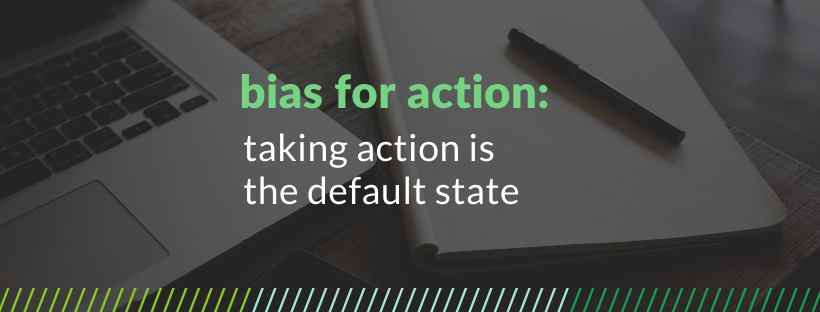“Change happens at the speed of trust.”
In the last few weeks in particular, in a year filled with undeniable markers of how systems and institutions must fundamentally change, one of our sector’s “automatic defaults” has become very apparent to me: the bias for action. Painfully so, at times.

Though incisive, the bias for action can be reactive, anxious, a killer of trust. The bias for action lets people believe in motion is the best state of being. The bias for action makes people believe that they are doing something even if it is merely keeping themselves busy. It treats time as a scarce commodity. In our sector, we have created tool after strategy after report that reflects this bias for taking action.
The bias for action ensures we get things done, no doubt. But we end up valuing that effort and striving/solving energy more than we value building and maintaining relationships. We remain focused on ourselves rather than looking around and noticing what’s really happening in the literal and figurative ecosystems around us. We don’t make room or leave energy for deliberation or discernment between options, for consent, for celebration, for grief, for disagreement, for repair, for trust and togetherness. This has had major implications on the progress made (or rather, not) on anti-racism within the global development sector.
This year it has been so readily apparent that our speed, our “doing”, has been more important than our direction. In that impulse, that unconsciousness of taking action, we uphold the status quo.
Doing keeps us occupied and placated. Doing ensures we never look at what’s in the shadows. Doing becomes a futile attempt to prove our worthiness and our commitment and our relevance by our busyness. We choose it over and over again, because our bodies and the land have been reduced to resources for the taking – the result of racialized, settler colonial capitalism.
Sitting in the unknown is so uncomfortable, and I noticed a severe aversion to it in our sector in 2020 – the year that more than ever before, we learned we cannot predict the outcomes. For me, 2020 revealed the danger of not interrogating our bias for action.
I won’t pretend that it won’t be painful to unwind from the bias for action. It means we will have to sit with ourselves, with our failures, with our fears, our histories. It means that it will be harder to ignore suffering – our own and other people’s.
And…there is good news! We have the freedom to do something differently if we dare shift our bias for action in 2021. We can dare to navigate uncertainty in a time when it can seem so difficult and so necessary to dream. To do so, we can break pace, rest, reflect, invite the questions, integrate, unlearn disconnection, and relearn togetherness. We must establish new practices – apart from our standard ways of working in the sector – so that as we are left with only ourselves, we are not still looking for a way out of 2020, but a way forward in 2021.
Let our action have the heft of our wisdom. ~Krista Tippett
***
Related Posts from 2020
Willing to say what needs to be said


Jennifer this is such a wise post. Our ancestors are watching. Thank you.